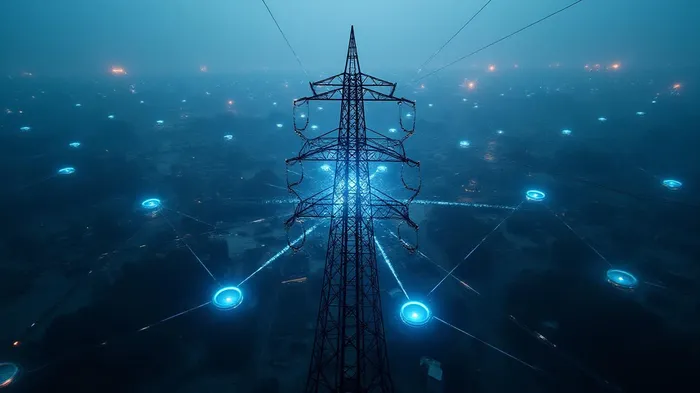The Silent Storm: Why Cybersecurity Vulnerabilities in Energy Infrastructure Are a Wake-Up Call for Investors
The recent grid outage at Xcel EnergyXEL--, triggered by extreme weather and wildfire mitigation protocols, has exposed a deeper truth: the energy sector’s physical infrastructure is increasingly intertwined with digital systems—and both are vulnerable to collapse. While this outage was weather-related, the incident underscores a growing systemic risk for utilities: a cyberattack could replicate the chaos of natural disasters, with far less warning. For investors, this is no longer a hypothetical scenario—it’s a call to reposition portfolios toward firms building resilience or insuring against cyber fallout, while steering clear of laggards.

The Xcel Outage: A Mirror for the Industry’s Digital Weaknesses
Xcel’s March 2025 outage, affecting 65,000 customers in Texas and New Mexico, was caused by high winds and proactive wildfire prevention. Yet the incident revealed a critical flaw: modern grids rely on interconnected systems—smart meters, cloud-based outage tracking, and digital control centers—that could be hijacked by cyber adversaries. While Xcel’s use of tools like F5 Networks’ web app scanning to isolate operational technology (OT) systems from IT networks is commendable, the outage shows how physical and digital systems are now so entwined that a breach in one could cascade to the other. The Colonial Pipeline ransomware attack of 2021, which disrupted fuel supplies for days, proved that even non-grid systems can cripple utilities. Today, the stakes are higher: a coordinated cyberattack could replicate the chaos of a storm, without the advance notice.
The Systemic Risk: Utilities Are Sitting Ducks
The energy sector is a prime target for cyberattacks. Power grids, oil pipelines, and renewable energy farms rely on aging hardware and software with weak encryption. A 2024 report by the Department of Energy found that 40% of U.S. utilities lack real-time threat detection for OT systems. The Xcel outage highlights how even well-prepared companies face vulnerabilities: their Enhanced Powerline Safety Settings (EPSS), designed to cut power during risks, could themselves be compromised. Imagine a hacker triggering EPSS remotely, causing rolling blackouts or ransomware demands. This isn’t fiction—utilities reported a 600% rise in cyber incidents from 2020 to 遑. The fallout would be economic (lost revenue) and geopolitical (energy supply disruptions), making this a strategic risk for portfolios.
Investment Play: Hardening the Grid, Insuring the Risks
The urgency for cybersecurity solutions in energy is a goldmine for two categories of firms:
1. Grid-Hardening Tech Providers: Companies like ABB (ABB), Siemens Energy (SI), and cyber specialists like Fortinet (FTNT) are retrofitting grids with AI-driven threat detection, air-gapped systems, and quantum-resistant encryption. These firms are already winning contracts from utilities under government mandates to modernize infrastructure. For example, Xcel’s partnership with F5 (FFIV) to scan exposed web apps is a template for others.
2. Cyber-Insurance Giants: Insurers like Allianz (AZSEY) and Chubb (CB) are expanding cyber-risk policies for utilities, pricing premiums based on a firm’s cybersecurity posture. This creates a perverse incentive: underprepared utilities will pay more or be excluded, pushing them toward defensive tech. Insurers with strong underwriting expertise here will outperform.
Red Flags: Utilities in the Crosshairs
Not all utilities are prepared. Firms with legacy systems, poor IT-OT integration, or resistance to investing in cybersecurity (looking at you, some mid-sized gas utilities) face existential threats. A breach could lead to operational paralysis, regulatory fines, and investor flight. The stock of underprepared firms will underperform as ESG-conscious investors flee and insurers raise premiums. Use metrics like cybersecurity budget as a percentage of revenue or third-party vulnerability audits to identify risks.
The Bottom Line: Act Now or Pay Later
The Xcel outage was a wake-up call. Investors must treat energy sector cybersecurity as a core risk—and opportunity. Buy the companies fortifying grids or insuring against digital disasters. Sell those clinging to outdated infrastructure. The next blackout won’t be caused by wind—it could be a keystroke.
The storm is coming. Build the ark.
Tracking the pulse of global finance, one headline at a time.
Latest Articles
Stay ahead of the market.
Get curated U.S. market news, insights and key dates delivered to your inbox.

Comments
No comments yet